- Home
- Rosanne Hawke
Zenna Dare Page 11
Zenna Dare Read online
Page 11
‘Feed them, ride a few. Especially if there are races coming up. Clean out the shed. Take some out bush. When all that’s done I mend fences.’
‘Fences?’
He points at the camels in the paddock. ‘See that big bull? That’s Josh. A coupla weeks ago he charged right through the fence. My job to fix it. The sheik’s getting old now. I’m his right-hand man. Might go with him up north when the races are on up there.’
I’m quiet, thinking about Caleb being away and wonder how Mr Wilson will cope with one of his players missing. Kate’s trying to get a pony to come to her. It won’t budge but she doesn’t seem to mind — being out here where it’s so wide and open puts her in a good mood. She’s not annoyed there’s mud on her sneakers and she’s even smiling at Hamilton scratching Horace’s nose. This must be when she gets the idea of joining the town pony club. Then I glance back at Caleb; he’s watching Kate too. He looks fluid, as though he’s been poured out onto the paddock and will grow here, bending with every breeze. Then he turns; sees me watching him and gives me one of his widest grins. I catch my breath at the beauty of it. And I know why he likes this job.
When I’m home I check my email and messages.
From: Jenefer Tremayne
To: Royal Cornish Library
Subject: Zenna Dare
Dear Librarian
I have found your site on the Cornish Web Ring and wonder if you can help me.
I’m researching nineteenth century opera or theatre in Cornwall with particular reference to a Miss Zenna Dare and/or Gweniver Rundle. Do you know of any resources that I may be able to find here in Australia?
Thank you
Jenefer Tremayne
From: Ross Shelley
To: Jenefer Tremayne
Subject: Zenna Dare
Dear Jenefer
I’m very sorry I haven’t been able to get back to you sooner. My server has been down. I don’t know much about Zenna Dare, except that she was a mysterious singer in the nineteenth century; mysterious because no one knew of her background and little is known even today. She sang in London for Queen Victoria, began a sensational but short career and suddenly disappeared. Her identity has been carefully guarded. Most singers and actresses were quite free with their real names and these, along with their stage aliases, can be found on the web, but not Zenna Dare’s. It may have been her real name, of course.
Hope this still helps
Ross of Ross’s World of Photographs.
Her real name? I hope not, for if it is my phantom tune will never be played.
Gweniver
Kapunda, 1850
Little think’st thou, poore flower,
Whom I have watch’d sixe or seaven dayes,
And seene thy birth, and seene what every houre
Gave to thy growth, thee to this height to raise,
And now dost laugh and triumph on this bough,
Little think’st thou
That it will freeze anon, and that I shall
To morrow finde thee falne, or not at all.
‘The Blossome’,
John Donne 1572–1631
There is little opportunity to write much since our days here are very busy. All the household tasks we did in Cornwall still have to be done, with less help. Every day we rise at five and there is the dusting, shaking of rugs, sweeping, and cleaning out the fireplaces. Candles have to be made, the butter too. It takes hours. There is no yeast and Mary makes bread called damper. The outside of it looks too dirty to eat since we make it in the ashes but the inside is passable. Mary has an open fireplace in the kitchen with a Dutch oven hanging over it and she has another pot we bury in the coals to bake the pasties in. Even the garden has to be tended so we can have vegetables and herbs.
Yesterday I walked down the street to help with the shopping. Mr. Whittaker has most things in his shop, even a Posting Office set up in one corner, but Mary and I make no use of his services now. Gladys has not written to Mary since her part in helping me, though I am sure Mama would have sent us a letter if she could write. At least Kapunda is a friendly place and everyone seems most hospitable, if busy.
Since Mary is well enough to look after the new baby now, I help Mrs. Orchard with the school she holds in her home a few hours in the afternoons and Emily and George come with me. Some children stay the whole week, the weekend as well. Mrs. Orchard keeps them if they are not collected by Friday night and on those occasions Emily and George help us to amuse the children on the Saturday.
Mr. Tremayne came last Saturday to offer his services. Mrs. Orchard had a spark in her eye as she informed me that he has been helping so much more of late. I find this talk distressing, for there is no way I can marry, and someone as suitable and pleasing as Mr. Tremayne just makes that knowledge all the more painful. Mary is the only one who knows why; I am sure she has not even told Will.
Mrs. Orchard is correct in her observations of Mr. Tremayne, I believe. He is friendly with quite a few people, one of them being the Buchanan gentleman who manages the huge Anlaby property. Mr. Tremayne, in his inimitable style, had helped this gentleman at some stage with his upturned carriage and the favour has never been forgotten. It is said that the Tremayne family always has a mutton roast on Sunday. And for today, he had managed to procure an invitation to take the school children to a picnic in Anlaby grounds.
Along with Mr. and Mrs. Orchard, the party consisted of the six children (Emily and George included), Mr. Tremayne and myself. I helped Mrs. Orchard pack the picnic and we started early in Mr. Orchard’s wagonette as it was all of eleven miles out. The excitement of the children was infectious and I found myself light-hearted, looking forward to the excursion. Nor were my expectations disappointed. Anlaby was a fairyland. There were people around with jobs to do, many buildings too, even with wooden slates on the roof. The house, all stone, with its terrace on three sides, was a lovely sight. It was the first time since leaving Cornwall that I had seen so many oak trees. There is a whole avenue of them, tiny yet, of course, and more besides, leading up to the house. Mr. Buchanan employs quite a few gardeners to tend the roses and little paths leading to hidden bowers. It was most delightful. There is said to be thousands upon thousands of sheep and the land stretches the same distance as from Camborne to Land’s End!
We chose a rise by the dam near the house, under shady trees. We were determined to enjoy the day despite flies and other vermin; how gentle the Cornish countryside seems in recollection. Nothing to hurt one except the nettles; but even then there were dock plants provided to alleviate the suffering.
The children played while Mrs. Orchard and I set out on a rug the picnic from the baskets. Emily had insisted on wearing the new boots I had brought for her from home. With her bonnet on, pinafore over her dress and white pantaloons showing off those boots, she was a pretty sight. Adventurous George and his friend were already climbing the nearby gum trees. Boys will climb; I did not fret, and Emily stood below watching. I could hear her from a distance, admonishing him to be careful. And suddenly we heard her screams.
‘What is the matter?’ Mrs. Orchard was already wiping her hands on her apron.
‘It’s Emily,’ I cried and we started down the rise to see. Soon it was all too plain. George was hanging by his little coat and one foot from a branch, his skirt up round his ears, and under him settled the murky deep water of the dam.
‘Don’t struggle,’ I shouted above Emily’s crying. ‘It’s all right, we’re coming.’ But Mr. Tremayne was there before us, hoisting himself up the trunk and climbing onto the branch. ‘Hold on, Georgie lad. Keep still. I can reach you.’ We all of us were hoping the branch would hold and they both wouldn’t drop into the water below. With stretching out along the branch, Mr. Tremayne managed to lift the poor boy back up. But for the fright, and losing his cap in the water, George seemed none the worse for the ordeal.
Emily was more distraught.
‘M-Mama said I was to look after him,’ she sobbed into Mr. Tremayne’s waistcoat as he knelt, holding them both. Gently, I took her from him.
‘You couldn’t help he climbed the tree, Emily. It wasn’t your fault.’
‘Mama would say ’tis,’ was her cry.
Mr. Tremayne raised his eyebrows at me. ‘Then there’s no need to worry Mama with it, is there? He is safe now.’
Emily turned grateful eyes onto him and not a tear was seen for the rest of the day. No doubt Mary still feels the loss of our brother. Just hearing Mr. Tremayne calling George ‘Georgie’ brought it all back to me. What a terrible time it was, though it seems to me a burden that Emily should not have to carry. I resolved also to offer to make George some trousers. He was nearly five, quite old enough to feel the indignity of being exposed upside down from a tree.
It is obvious Mr. Tremayne exhibits many tender attributes. It almost makes one feel that he could understand any affliction that could befall a person, but I do not dare test this theory. Never will I forget the way I was treated in Camborne with more than Christmas presents to show for my time spent in making a singing career. Being a non-conformist he will have narrow views, I am sure.
He has even signed the Temperance Pledge. My father took us to a Wesleyan chapel too but he had liked the occasional ale when the preacher was not watching.
No, I have seen what happens to folk who have to tread a different path in Cornish society, and the same Queen rules here. It is the same society with the same rules that must not be broken. And I must pay for breaking them. I will tell Redvers Tremayne, if he becomes more attentive, that I shall never marry.
Jenefer
I’m walking up the path under the pepper tree, thinking about something Caleb said the other week when we came back from Gawler Station. When I was with Caleb again in the confines of the ute, the intolerance we encountered on the train gradually faded to another time and place. Once we were past Freeling, green hills rolled up to meet us, like dogs happy to see us home. It was such a weird sensation; I felt like I’d been away a year and I was seeing it all afresh, as if it was part of me yet I didn’t have to say it was mine. I grin now as I remember kissing Caleb on the train — not exactly what Steffi would approve of, but it was as if those people forced me to make a stand. That kiss was a stamp on a document: instead of draft it said final copy.
I was just full of everything during that ride home and couldn’t help saying how beautiful it all was. I shocked even myself. If the Jenefer Tremayne of January could have heard me say that she would have puked. How can we change so quickly?
Did I say home? Home was where Cedar Rise was; my old friends, where we could walk to the station and be in the city in twenty minutes, go to cinemas and coffee shops whenever we wanted. But since the fated ‘train trip’ Cedar Rise is becoming blurry. That comfortable feeling of being one of the group splinters like an icicle being attacked by a pick when I remember Amy’s face as she saw Caleb. Guess I’ll never have that sense of belonging at school here either since it’s only for a year. Even though Erin and her friends are polite, it’s not what you’d call a ‘sharing of secrets’ level of relationship. I wonder if I expect too much; Ashleigh isn’t ‘in’ either, so maybe it takes ten years. Whether the distance they keep me at (which teachers wouldn’t notice by the way, or even the boys) has anything to do with Caleb I can’t tell. And what if I did stop doing things with him and the girls were more chummy with me in the way I’m used to? How long would it last? And wouldn’t I feel cheated that they only let me ‘in’ because I played by their rules? How could I respect myself?
Caleb was as happy as if I’d said I’d follow him to Mars on some expedition that only he believed in. ‘It’s the land.’ His hands were off the wheel again, sweeping the undulating hills into his vision. It suddenly reminded me — Dad gets this passion about things too. Look how he raved on when we first came here and I couldn’t care less. But that was then. BC. Before Caleb.
‘This is what being Australian is all about. It’s not the colour of our skins or how long we’ve been here, who our grandparents were. It’s this feeling for the land. It’s huge. When you know you belong. Like a relationship.’ He looked across at me as he said ‘relationship’ and I felt what he meant. Not necessarily about the land – I may never have his depth of feeling for the land – but I’m beginning to understand what it is he means and I feel I’m a part of it too.
I’m still grinning as I climb the verandah steps, not realising my life’s going to make another sharp turn. One I hadn’t calculated on yet, though it had to happen sometime. Kate doesn’t keep me in suspense.
‘We know your secret, Jenfa.’ Jealousy drips through the singsong lilt to her tone. Dad’s there in the lounge. He doesn’t waste any time either. ‘What’s this box Kate says you have in your room?’
My heart sinks. So Kate found it at last. This is it. No more Zenna Dare. At least no more Zenna Dare on my own terms. And what if it all gets stopped? There’s not enough time to think of another History topic. They’re both watching me; even the energy to be angry with Kate drains away. Steffi’s putting the skillet on the stove; I hear its heavy bang through the wall. Incredible. The things that seem clear when your life is about to change. Hamilton’s on the rug playing with Sher Khan. He must have got him used to being loose in the house already. Sher Khan’s running, Hamilton claps his hands; the rabbit stops. I hadn’t noticed him running round like this before. Life’s been marching on, while I’ve been immersed in the nineteenth century.
I can’t just tell them the box is nothing. I remember something else: Gweniver is Kate’s triple-great-grandmother too. And so I climb into the cage and go down with the sharks.
‘It was hidden in the room under the stairs.’ I hear Kate’s indrawn breath, like a steam train ready to go. Her eyes are shining. Plain excitement? Or triumph?
‘Who put it there?’ Dad.
‘Gweniver Tremayne.’
‘Can I see? Dad?’ Dad ignores Kate for a bit. He’s still facing me. He looks hurt. I never expected that. Anger and ‘Let’s look at it now’. That I expected, and I’m braced for it, but not this half-surprised, half ‘Why didn’t you trust me?’ look.
‘Dad — I just wanted to see what I could find out before I told you. So there’d be something to say. It didn’t all make sense —’
‘What didn’t?’
‘What’s in the box?’ They’re both talking at once and Hamilton picks up Sher Khan, sits back and watches us.
‘There are papers —’
‘Papers?’
‘Pages, really, but they’re not in order, not dated. One or two are. There are a few letters too. Poems.’ I have to make him understand. ‘It’s like a jigsaw puzzle.’
‘I like jigsaw puzzles.’ Kate’s pouting. Dad looks as if he feels the same.
‘It belongs to the family, Jenefer.’
‘Yeah, not just you —’ this from Kate until Dad quietens her with one of his looks. He’s got a few on hand today.
I’m trying not to get teary; he can do it to me every time. ‘Guess you want to see it.’
‘Yes, that would be a good start, Jenefer.’ The dryness of his tone hurts more than the shouting he can lash out with.
I lead the invasion down the stairs, hoping Kate hasn’t broken the wheel trying to get into the box. Oh, why wasn’t there a lock on my door? I could have put a padlock on the bookcase, but that would have given the secret opening away for sure. I drag out the box. Dad helps; then kneels down. He whistles, just like Caleb. ‘What a work of art!’
Then I show them how to open it and hand over the photos of Gweniver and Zenna Dare. Dad’s thoughtful for a while, then, ‘I can see why you kept this quiet, Jenefer. There’s something here, isn’t there?’
I know what he means and my breath catches suddenly. He
understands! He’s looking up at me again and it’s not the ‘I’m boss of everything’ look that I’d dreaded whenever I’d envisioned this moment. He’s still got the photo of Zenna Dare in his hand.
‘So Gweniver had an alias?’ His face is a question mark. How did he get to that so quickly? I’d always hoped, of course, right when I’d read that very first card: Dear Zenna, why did you not come? But I had to check out if Zenna Dare wasn’t a real person so I could be sure. It would have been devastating to go down that track and find out Zenna was just a pet name after all, as Aunt Dorie thought. I nod at him, still hesitant.
‘I can’t prove it, but it looks like it. No one with the name of Zenna Dare was even born in Cornwall or England, let alone came out here. As far as can be found out.’ A new gleam in Dad’s eyes now. Interest? Respect?
‘An actress?’
‘Singer, I think.’ And I tell him about Ginny Rivers, the music halls, the tea gardens. Show him the playbill. Everything I know so far. ‘There’s something else.’
‘What’s that?’
How can I explain it? To me it’s clear. It may not be to him, nor do I want to say every single thing in front of Big Ears Kate. ‘She was sad about something.’
‘How can you tell that?’ I know what’s he’s thinking. Supposition, women’s intuition. So I show him the pages I’ve typed already.
‘It’s hard to explain. A tone in the writing. Sometimes the writing is so hard to read it’s like she must have been upset. She always refers to something that’s happened before but doesn’t spell it out. Says she’ll never marry, but we know she did.’ And what about the singing? Didn’t she think she was born for it? Why give it up and come to Australia?
Dad looks at me a moment, like he’s searching my face for clues before he glances down, and reads aloud:
Truly I do not know what to do. Old Harry Sanders, the organ grinder, seems to understand. He has a daughter my age, he said. He has been very kind to me when I have needed comfort the most. Now I shall go home, just as he suggested. I don’t belong in the Music Halls and Pleasure Gardens. I thought I could do it but the cost is too great. R will not understand. I am making him a pretty penny, I think. But he has many students; he won’t be devastated for long.

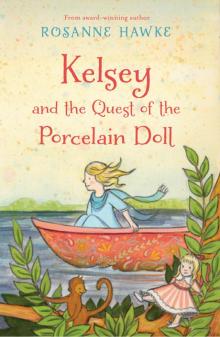 Kelsey and the Quest of the Porcelain Doll
Kelsey and the Quest of the Porcelain Doll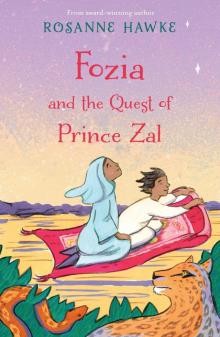 Fozia and the Quest of Prince Zal
Fozia and the Quest of Prince Zal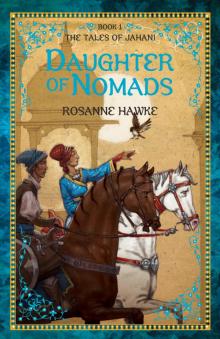 Daughter of Nomads
Daughter of Nomads The Truth About Peacock Blue
The Truth About Peacock Blue Taj and the Great Camel Trek
Taj and the Great Camel Trek The War Within
The War Within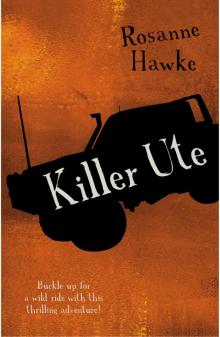 Killer Ute
Killer Ute Shahana
Shahana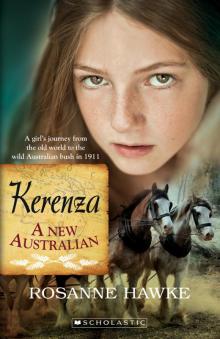 Kerenza: A New Australian
Kerenza: A New Australian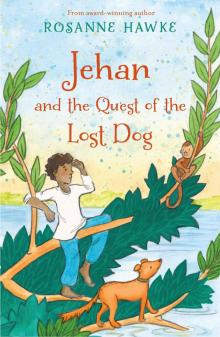 Jehan and the Quest of the Lost Dog
Jehan and the Quest of the Lost Dog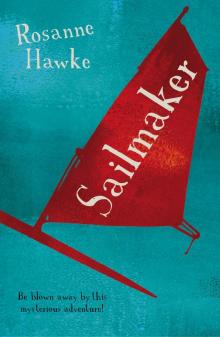 Sailmaker
Sailmaker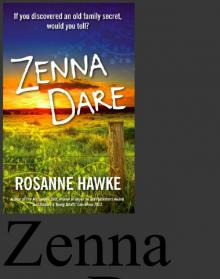 Zenna Dare
Zenna Dare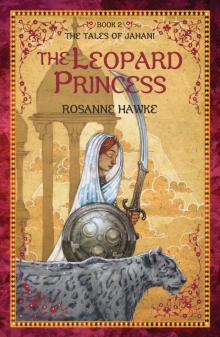 The Leopard Princess
The Leopard Princess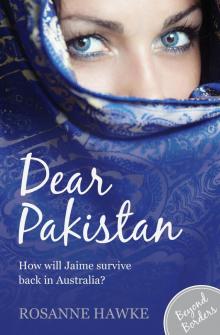 Dear Pakistan
Dear Pakistan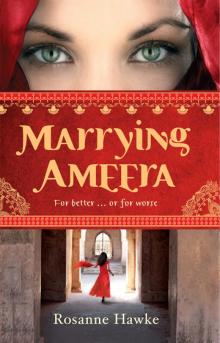 Marrying Ameera
Marrying Ameera Finding Kerra
Finding Kerra Spirit of a Mountain Wolf
Spirit of a Mountain Wolf